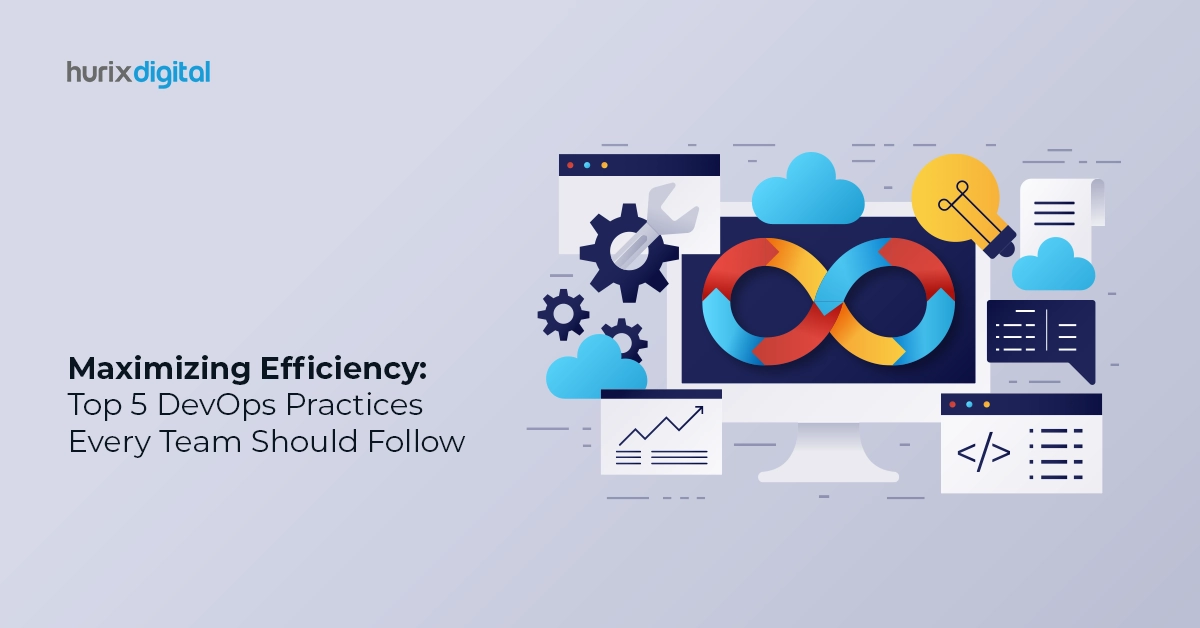
Maximizing Efficiency: Top 5 DevOps Practices Every Team Should Follow
Summary
Discover key DevOps practices that can enhance team efficiency. This blog outlines the top five practices that every team should implement to streamline development and operations.
DevOps is all about implementing a set of proven strategies, principles, and best practices that are substantial for modern software development. DevOps can help organizations encourage reliability, expedite software delivery, enhance quality, and facilitate agility.
If modern industries want to evolve business requirements and enhance customer experience, it is imperative to follow critical DevOps principles across various fronts. Embracing DevOps, best practices can significantly enhance team productivity experiences and encourage a culture of innovation within organizations.
Here is an overview of DevOps methodology and best practices that will revolutionize your software development processes and enhance deployment procedures!
Table of Contents:
- What is DevOps?
- The Significance of DevOps
- 15 Significant DevOps Principles
- 5 DevOps Best Practices
- Conclusion
What is DevOps?
DevOps is a strategic approach that enhances innovation and communication within organizations. It encourages collaboration between software development and operations teams.
The ultimate motive of DevOps is to accelerate software deployment while maintaining high quality. It includes a transformative methodology that optimizes the speed, quality, and efficiency of software delivery processes.
DevOps can also amplify efficiency across all stages of software development and deployment. Issues are identified and addressed sooner in the process. Therefore, applying DevOps best practices and principles can reduce the time and expense associated with creating software and rectifying issues in the development cycle.
The Significance of DevOps
DevOps plays a fundamental role in enhancing organizational efficiency, productivity, security, and responsiveness. Businesses can streamline their workflows using DevOps practices and bring new products and services to market. DevOps drives improvements in organizational efficiency, effectiveness, and overall performance.
Thus, it critically expands the organization’s competitiveness and customer satisfaction by providing quicker access to new features and functionalities. Let us look at some integral facts about DevOps:
- The market size of DevOps is estimated to grow at a CAGR of 19.7% from 2024 to 2028 and surpass $25.5 billion in 2028.
- 86% of organizations see the value of DevOps as important, and this figure is expected to cross 93%.
Implementing DevOps practices has consistently reduced friction and lead times and identified inefficiencies in workflows. The success of a DevOps implementation depends on a systematic DevOps culture, which can lead to open communication, shared responsibility, and a relentless pursuit of improvement.
Also Read: The Future of AEM Mobile Apps: Current Trends and Future Predictions of 2024!
15 Significant DevOps Principles
DevOps principles are the foundation for the DevOps culture. Here are the core 15 DevOps principles:
1. Integration of Systems
DevOps stresses the importance of integrating diverse systems and tools which helps establish a cohesive workflow. Different teams can collaborate and eliminate barriers between development and operations.
2. Culture of Innovation
DevOps enhances innovation by encouraging experimentation and the exploration of new methodologies. High-profile DevOps teams can restore failed or disrupted services in less than a day. This culture encourages creativity and empowers organizations to remain competitive.
3. Compliance Adherence
DevOps practices align with regulatory and compliance requirements, and DevOps automation ensures consistent application of compliance checks. This reduces the risk of penalties, fines, and non-compliance.
4. Infrastructure as Code IaC
IaC treats infrastructure provisioning as code. It further enables DevOps automation, version control, and consistency in managing infrastructure resources. It allows teams to manage infrastructure configurations through code and ensure reproducibility.
5. Cross-Functional Teams
Cross-functional teams comprise members with diverse skills which ensures end-to-end responsibility for delivering and maintaining applications. This approach promotes effective teamwork.
6. Scalability
DevOps emphasizes designing infrastructure and applications that empower organizations to handle increased workloads. They can further adapt to changing demands and support organizational growth without compromising performance.
7. Continuous Deployment
Continuous deployment deploys code changes to production environments after passing tests. This practice further accelerates the release process and ensures quick delivery of new features and updates to users.
8. Version Control
Version control systems empower DevOps teams to manage code changes, collaborate effectively, and maintain a comprehensive history of alterations. Version control ensures code stability and facilitates collaboration among developers.
9. Effective Communication
Clear and open communication is paramount in DevOps. Teams are encouraged to share information, insights, and ideas using tools like chat platforms. Documentation plays a vital role in facilitating efficient communication.
10. Security Integration
DevOps practices ensure that security considerations are integrated into every phase of software development. This protects against vulnerabilities without hampering speed and efficiency.
11. Disaster Recovery Planning
In case of unexpected failures, DevOps teams use disaster recovery plans to minimize downtime and data loss.
It has been researched that 60% less time is spent on handling support cases and 33% more time is spent on infrastructure improvements with DevOps. Disaster recovery plans maintain business continuity and protect data integrity.
12. Continuous Delivery
Continuous delivery automates the software release process and minimizes manual intervention. It reduces delays and encourages a faster time-to-market for new features and updates.
13. Feedback Mechanisms
Gathering feedback from stakeholders helps identify issues early in the development cycle. This leads to higher-quality software through prompt and effective problem resolution.
14. Data-Driven Decision Making
DevOps encourages decision-making based on data and analytics. Organizations rely on key metrics to make informed choices regarding development, deployment, and infrastructure scaling.
15. Monitoring and Logging
Continuous monitoring and logging provide real-time visibility into system performance and issues. These insights enable teams to detect and address problems promptly.
5 DevOps Best Practices
This list isn’t exhaustive, but these 5 DevOps practices will help you accelerate and enhance your DevOps adoption process.
1. Integrate Key Features Early in the Development Lifecycle
Organizations that prioritize trust and empathy gain a significant advantage in embracing DevOps principles. Break down interdepartmental silos and encourage teamwork, collaboration, and approval workflows across teams.
- Integrate Security – DevOps emphasizes integrating security into initial design stages and integrating it into CI/CD pipelines. Organizations can enhance infrastructure security while reducing vulnerabilities and safeguarding against potential threats.
- Prioritize Observability and Key Metrics – DevOps thrives on feedback and continuous improvement. It necessitates the identification and tracking of relevant metrics to drive progress.
- Learn and Improve from Incidents – Mishaps are an inevitable part; thus, establishing a process to document incidents and derive lessons from them using DevOps becomes crucial. Post-incident reviews offer valuable insights into refining incident-handling processes for future occurrences.
2. Embrace Continuous Integration and Delivery – CI/CD
Continuous Integration involves integrating small code changes frequently into a centralized repository.
Salesforce DevOps ensures the repository remains in a stable state by validating small changes through automated builds and tests. Continuous Delivery continuously prepares code for deployment and simplifies the deployment process.
3. Prioritize Understanding Concepts Over Tools
With DevOps, you must focus on fundamental concepts rather than integrating new tools. This will help you select tools that address specific needs, recognize the value of leveraging DevOps tooling, and enhance your team’s time and resources.
Here are some crucial practices to integrate and understand:
- Implement DevOps Automation – Automating routine tasks streamlines product delivery efforts by reducing manual intervention. When tasks like code building, deployment, testing, and system monitoring are automated, organizations benefit from enhanced efficiency, reduced errors, and increased system reliability and scalability.
- Implement Automated Testing – Automated testing plays a pivotal role in DevOps’ success by enhancing code quality and reliability. Organizations reduce reliance on manual testing and decrease the risk of introducing bugs into production systems.
4. Integrate Agile and DevOps
Agile facilitates swift value delivery to customers with fewer complications. Agile works on a four-phase workflow, dividing large-scale projects into smaller tasks. It further uses Scrum and Kanban as foundational frameworks.
DevOps and Agile methodologies can augment software planning and development. DevOps with sprint planning can resolve inter-team communication challenges, enhance sprint discussions, and facilitate timely software releases.
5. Choose the Right DevOps Tools
Selecting the appropriate DevOps tools impacts the success of DevOps initiatives. Here are some key features that you must consider before choosing the best tools:
- User-friendly tools that seamlessly integrate with existing systems
- Tools that can enhance efficiency, reduce errors, and accelerate value delivery.
- Prioritize widely recognized solutions to promote consistency.
- Choose tools that come with active support, communities, DevOps automation capabilities, security, and affordable costs.
Also Read: The Role of UI/UX Design in Creating Successful Mobile Apps
Conclusion
Embracing DevOps best practices simply faster delivery, enhanced quality, and increased reliability in software development for organizations.
By incorporating DevOps methodology, you can refine your development processes, enhance business agility, and augment customer satisfaction. This essence of DevOps ensures an ongoing journey of learning, experimentation, and refinement, which helps organizations reach their full potential.
For practical implementation, consider Hurix Digital, a comprehensive solution that offers all the essentials for software development and operations. The professional teams can assist you in effectively deploying DevOps principles and exploring its capabilities.
Contact us today to learn more about applying DevOps Best practices!

Currently serving as the Vice President of Technology Delivery Operations at HurixDigital, a prominent global provider of digital content and technology solutions for publishers, corporations, and educational institutions. With over 16 years of experience spanning EdTech and various domains, I hold certification as a SCRUM Product Owner (CSPO). My expertise includes operations, finance, and adept people management skills.



